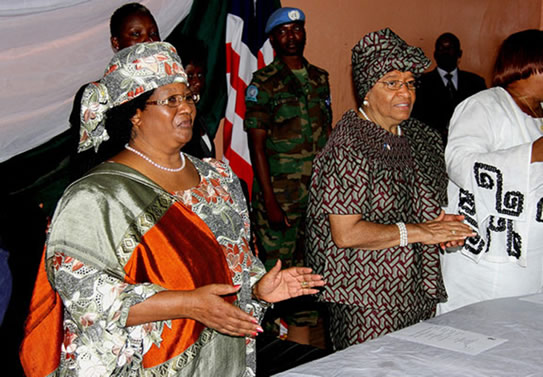 After the civil war in Liberia, the women of Gbokuma village came together to address pressing issues like poverty, illiteracy and lack of access to primary healthcare. Today, about ten years later, the group of self-confident and successful women farmers are expanding their business and other ambitions through the P4P programme.
After the civil war in Liberia, the women of Gbokuma village came together to address pressing issues like poverty, illiteracy and lack of access to primary healthcare. Today, about ten years later, the group of self-confident and successful women farmers are expanding their business and other ambitions through the P4P programme.
The Gbonkuma Rural Women Association (GRWA) has 250 members and is headed by female Executive Director Fatu Namieh Nyen, respectfully known as Ma Fatu. Ma Fatu and GRWA came into the public limelight in Liberia when President Ellen Johnson Sirleaf visited the group in 2011. During this visit, the President was inspired by the dynamism and commitment of GRWA and the important role that they were playing in improving the lives of women within their community. A strong proponent of P4P as a vehicle for rural transformation, President Ellen Johnson Sirleaf personally advocated for the inclusion of GRWA in P4P, to enable the socioeconomic empowerment of its members and the broader community.
Most of those who attended the P4P Annual Consultation in January 2013 remember the passionate statement delivered by Fatu Namieh Nyen. She left few in the audience untouched when she described the central role that P4P is playing in the lives of Liberia’s post- conflict affected women.
Under the charismatic leadership of Ma Fatu, GRWA’s members submitted a formal letter of request to participate in P4P. Impressed by GRWAs organizational cohesion and productive capacity, WFP registered GRWA as a P4P producer in October 2012. Under their current contract, GRWA supplies WFP with rice and beans. These commodities are in turn distributed to girls in primary school as a take home ration to incentivize keeping girls in school under the WFP supported school feeding programme run by the local Ministry of Education. Awarded a contract to supply 45 mt of paddy rice in November 2012, the group has since successfully aggregated and sold 25 mt to WFP, earning a total of US $10,000 from the sale of paddy only.
The women of GRWA have benefitted from P4P in a number of different ways. By procuring rice at a guaranteed minimum price, group members have been able to plan their agricultural activities with greater confidence, enabling them to expand their farms. GRWA’s productive capacity has been rejuvenated through the provision of a rice milling machine and the construction of an improved storage warehouse and drying floor. This has enabled the group to mill their own rice, for which they earn additional income and reduce post-harvest losses.
By pooling some of the funds which they have accrued from P4P, the group has managed to open a day care centre where the young children can be looked after whilst their mothers carry out the daily farming and marketing activities. At the household level, women have been able to invest in the future of their children through using their incomes to pay for school fees, learning materials and healthcare. As one of GRWA’s members explained, “P4P has inspired us, boosted our morale, and is improving our lives. We will work with P4P as long as it stays around.”


